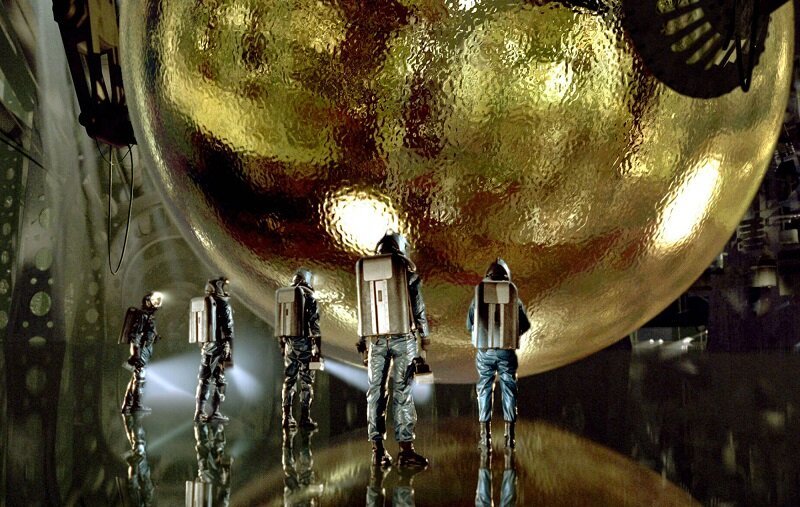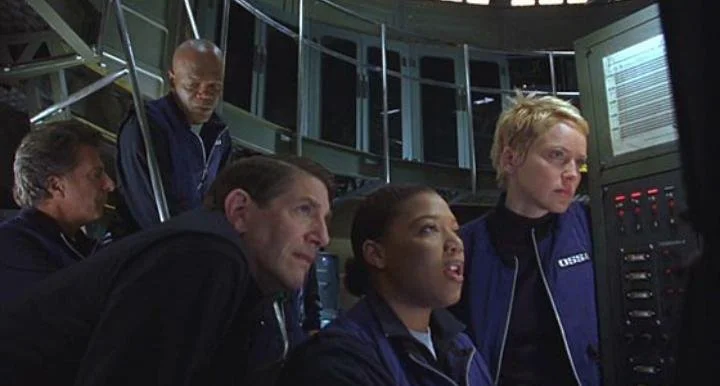Hangover Cinema: Sphere
Welcome to another installment of Hangover Cinema! This column seeks to shine a light on the less spectacular or unloved movies of recent vintage—films that marked the decline of a trend, filmmaker, or actor, or maybe the whole package came along a bit too soon. I like to cover things you’d watch on afternoon cable simply because you don’t feel like doing anything else. These are movies that you start, and you feel oddly compelled to get to the end despite it not necessarily being a work of art.
I’ve had this concept rattling around in my brain for a few years, thinking it would make a good podcast or series at a revival cinema. Anytime I started brainstorming for odd, sometimes half-assed, unspectacular and otherwise forgotten movies, one director was always at the top of the list: Barry Levinson.
Barry Levinson started as a comedy writer and performer before kicking off his career as a director in the late ‘70s. After he wrote and directed the Baltimore coming-of-age film Diner, it’s safe to say he had one of the better “films for adults” decades of all time. The Natural, Good Morning Vietnam, and Rain Man, among others, all garnered critical and commercial praise throughout the ‘80s and early ‘90s. Several of these movies are definitely in the category of “movies that boomers thought deserved awards.” When weighing the whole of his career I would say Levinson will go down as noteworthy, but not much else. As much as I’d love to rant about Wag the Dog, Toys, or Bandits, the movie I selected is Levinson’s only foray into science-fiction: 1998’s Sphere.
Cashing in on the downslope of science-adventure movies made post-Jurassic Park, Levinson adapts another book by infamous grump and notoriously crappy writer Michael Crichton. Crichton suffers from the sci-fi affliction where his premises exceed his execution, as much as I’ve enjoyed many of his books and the films based on them. For filmmakers in the late 20th century, using an airport book for source material was considered easy money. Many of the bestselling authors responsible for this trend ended up being too prolific, resulting in a lot of bad movies being green-lit. Sphere checks all the boxes of things past their prime in 1998.
The movie drops us right in the deep end, so to speak. Four scientists, played by Dustin Hoffman, Sharon Stone, Samuel L. Jackson, and Liev Schreiber, have been called to the middle of the Pacific Ocean where a secret military operation is already underway. An enormous vessel, unlike anything on Earth, has been found on the ocean floor. The reason for this particular ensemble? The Clinton administration paid Dr. Norman Goodman (Hoffman) to make a report on what to do in case of contacting an extraterrestrial lifeform. Hoffman chose to name scientists he knew personally at the time and took the payday for the report. These characters are pulled in because of his ability to bullshit.
What would normally be an excellent cast in a dramedy has the breath pulled from it immediately. Stone and Jackson, instead of playing up their undeniable charms, portray pompous intellectuals. Most of the early dialogue between characters is either jargon or one-upmanship. Liev Schreiber does his best silver-tongued astrophysicist to bring some levity, filling in the Ian Malcolm-esque “slick genius” role that these kinds of movies needed.
By 20 minutes into the movie, we find the crew already at the bottom of the ocean, suited up and walking into the ship. This establishes the claustrophobic, ominous visual language and pace of the film. Within the next 10 minutes, signs in English/Spanish on board the ship reveal that it is actually from Earth, in the distant future. You’d expect this to be the ultimate twist in the movie—but not so fast. Locked away in this dead vessel for 300 years is a giant floating golden sphere. It looks like liquid (‘90s CGI), constantly shimmering and reflecting everything in the room except the people looking directly at it.
The characters, and the audience, are all wondering: Where did this orb come from? What’s it made out of? Why doesn’t it reflect certain things? Why is it so dope? A much more central query is soon posed by Jackson: If the ship and the sphere are from the future, why doesn’t whoever retrieved it from space know that our characters discovered it in the past? The logical outcome is no one ever found out about it, which would mean every character in this situation dies at the bottom of the ocean. This is the most compelling piece of the movie. It becomes a close-quarters puzzle.
Harry (Jackson) is the first to enter the sphere. While not remembering anything about the experience, he is oddly more calm than anyone about being stranded at the bottom of the ocean due to a developing storm on the surface. From here, the movie becomes increasingly convoluted.
The sphere sends out a signal to their headquarters introducing itself only as Jerry. Jerry begins talking to the crew through a cipher on the crew’s computer. Jerry knows about what’s going on inside their quarters as the crew begin to unravel while discussing the mission. We find out that Jerry is actually Harry’s subconscious expressing itself independently. (“Jerry = Harry” is so unintentionally hilarious.) By going into the sphere, he is now able to physically manifest his thoughts. For example, he is unknowingly responsible for the giant squid that attacks the ship, killing some of the crew. That’s right: the sphere gives you magic powers that will create anything you imagine! This is somewhat akin to Stanlislaw Lem’s classic novel Solaris. The character interplay is a bit hamfisted compared to Tarkovsky’s film of the same name, but Levinson does execute some eerily still and dreamlike sequences to illustrate the crew’s descent into madness.
The core trio of Hoffman, Stone, and Jackson are the only survivors of further mortal accidents that befall the rest of the characters. Through paranoia and claustrophobic revelations, they realize the powers they’ve inherited give them control over the fabric of reality. With this knowledge, they decide to forget the sphere’s existence entirely. This closes the paradox posed by Jackson earlier in the film. So as an ending, we get a scene of them sitting in a room quietly forgetting the events of the movie, while the sphere unceremoniously launches itself back into space to be found by the future crew.
As with Crichton’s material, the premise of Levinson’s adaptation outshines its execution. We expect a big set piece or a final revelation as a hopeful ending, but the movie concludes as abruptly as it began. By erasing any explanation as to why several people died at the bottom of the ocean investigating a spacecraft, the movie undoes itself.
While writing about this as a mess, I am doing a disservice to how gripping the film is in real time. Twists and turns seem to spill out during the last half, until we get to the characters’ philosophical conversations about the implications of the sphere. What makes the movie work on cable are the mysteries driving the plot, and how urgently the film delivers more questions. While other sci-fi films have handled these concepts, environments, and ensemble-types with more slow burning cinematic aplomb, there is a high-budget B-movie feel to how clumsily this movie plays out.
Between commercial breaks on cable in some nowhere hotel room, it’s very likely you’ll want to know what you just saw and where this particular journey to the deep is taking you. It is a singular piece of Levinson’s filmography, a forgettable fascination that grips you in the moment but leaves you with no clear memory of how it unfolded. The magic trick this underwater sci-fi thriller proposes for its plot’s conclusion (forgetting the sphere exists) is unintentionally the same trick it pulls on the viewer.





Mike Sharp is a native Texan, and born movie-lover. With parents afflicted by movie addiction, and an illegal cable hookup, Sharp was raised in a house where the television was always on. Compulsively watching filmographies of every director, writer, cinematographer, actor, and composer he could, he amassed knowledge reserved only for the likes of trivia and drunken conversations about nostalgia. As an Austin musician, Sharp has scored several local short films and documentaries as a solo artist, along with playing in dozens of bands.